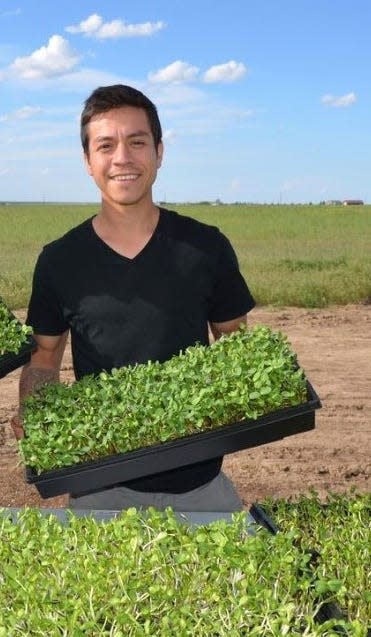New ag commissioner reflects on pandemic lessons

One of the newest members to join the Colorado Agriculture Commission was recently featured on a national webinar discussing lessons the COVID pandemic holds for local and regional food systems and what the “new normal” might look like in the months and years to come.
“It’s almost like we are in a laboratory,” said Roberto Meza of living in a historic time marked by the most significant disease outbreak in at least a generation.
Meza was born in Mexico City. His interest in farming began after he developed health issues as a graduate student. He went on to co-found Emerald Gardens, a year-round passive-solar greenhouse growing operation in Bennett, Colorado, as well as a regional food hub. He’s currently vice president of the National Young Farmers Coalition, a member of the Denver Sustainable Food Policy Council and a board member with the High Plains Food Co-op.
His appointment to the Colorado Agriculture Commission runs through 2025.
“My story is one of survival and persistence, grounded in specific values,” he said during a webinar hosted by USDA’s Ag Marketing Service. “For a person of color in Colorado, starting a farm is extremely difficult.”
When the pandemic began, in the spring of 2020, his farm was already struggling: a grocery partner had racked up $10,000 in unpaid bills. Then a month later all his restaurant accounts abruptly ceased due to the pandemic shutdown.
“Thankfully I had been doing relationship building with food access organizations,” he recalled. “When they started to receive federal funding, they came to us for greens, micro-greens and herbs.”
In a nutshell, food access organizations had suddenly become a viable market.
Pivoting to meet the needs of rising food insecurity and interfacing with a wide range of public, private and nonprofit initiatives not only turned the farm around, it literally saved it, he said.
“This is something that should have been in place from the very beginning,” he noted. “A community connecting to its farmers is literally the cornerstone of resilience.”
Those early lessons from the pandemic became the genesis for the East Denver Food Hub, a social enterprise he founded to connect farmers more directly with consumers.
“We don’t want to build a business off of food insecurity, we want to end it,” he said.
He sees the current moment as a golden opportunity to “mount a collective movement for a more equitable food system” and make the “invisible visible.”
“When you go to the grocery store, you just see a product and a price, you don’t see the human experiences that contributed to that product,” he explained. “The former food system did a good job of making that invisible. Now we are in a process of analysis and understanding and demystifying food systems.”
Alongside regenerative agriculture, which sequesters carbon by healing the soil, he wants to see something similar happen in terms of what he called “capital sequestration.”
“We need to sequester capital, and put it back in our communities, and help people in their efforts toward self-determination,” he said. “How do we build economies of collaboration that can hold their own against economies of scale, and then connect these efforts on a local and global scale?”
The food access sector is becoming more aware of the role it can play in community wealth building, by serving as a strategic partner that provides capital for new enterprises, he observed.
A number of Colorado programs and initiatives are now funneling money toward food pantries for purchasing fresh and local food, and food hubs are creating networks that function as webs for moving food more efficiently from where it’s grown to those who need it, he said.
All of this activity enriches people on the ground in local communities, he said.
One of the most positive things to come out of the pandemic is recognition that existing assets, sometimes not highly visible, can be leveraged to bring about positive change, he said.
Other panelists on the AMS webinar talked about the importance of re-localizing the food system in ways that are cost effective for farmers, better understanding what food growers need to recover in the wake of natural or manmade disasters, and crafting federal programs that fit the needs of small farms as well as large ones.
This article originally appeared on LA Junta Tribune: New ag commissioner reflects on pandemic lessons
